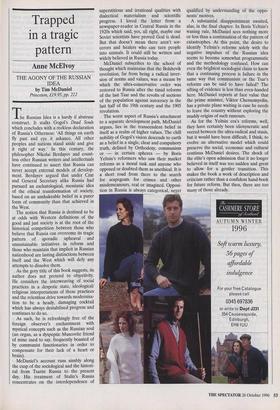Trapped in a tragic pattern
Anne McElvoy
THE AGONY OF THE RUSSIAN IDEA by Tim McDaniel Princeton, £19.95, pp. 212 The Russian Idea is a hardy if abstruse construct. It stalks Gogol's Dead Souls which concludes with a reckless declaration of Russia's Otherness: 'All things on earth fly past and eye it askance. All other peoples and nations stand aside and give it right of way.' In this century, the philosopher Nikolei Berdayev and count- less other Russian writers and intellectuals have continued to assert that Russia can never accept external models of develop- ment. Berdayev argued that under Czar and General Secretary alike Russia had pursued an eschatological, messianic idea of the ethical transformation of society, based on an unshakeable belief in a purer form of community than that achieved in the West.
The notion that Russia is destined to be at odds with Western definitions of the good and just society is at the root of the historical competition between those who believe that Russia can overcome its tragic pattern of sporadic upheaval and unsustainable initiatives in reform and those who maintain that implicit in Russian nationhood are lasting distinctions between itself and the West which will defy any attempts to dissolve them. As the gory title of this book suggests, its author does not pretend to objectivity. He considers the interweaving of social practices in a despotic state, ideological/ religious interpretations of these practices and the relentless drive towards modernisa- tion to be a heady, damaging cocktail which has always destabilised progress and continues to do so.
As such, he is refreshingly free of the foreign observer's enchantment with mystical concepts such as the Russian soul (an organ, as a dyspeptic Muscovite friend of mine used to say, frequently boasted of by communist functionaries in order to compensate for their lack of a heart or brain).
McDaniel's account runs nimbly along the cusp of the sociological and the histori- cal from Tsarist Russia to the present day. His treatment of Stalin's Russia concentrates on the interdependence of superstitious and irrational qualities with dialectical materialism and scientific progress. I loved the letter from a newspaper-reader in Central Russia in the 1920s which said, yes, all right, maybe our Soviet scientists have proved God is dead. But that doesn't mean there aren't sor- cerors and healers who can turn people into animals. It could still be written and widely believed in Russia today.
McDaniel subscribes to the school of thought which maintains that the Bolshevik revolution, far from being a radical inver- sion of norms and values, was a means by which the ultra-conservative order was restored to Russia after the timid reforms of the last Tsar and the revolts of sections of the population against autocracy in the last half of the 19th century and the 1905 revolution.
The worst aspect of Russia's attachment to a separate development path, McDaniel argues, lies in the transcendent belief in itself as a realm of higher values. The chill nobility of Gogol's vision descends to earth as a belief in a single, clear and compulsory truth, defined by Orthodoxy, communism or — in certain spheres — by Boris Yeltsin's reformers who saw their market reforms as a moral task and anyone who opposed or doubted them as unethical. It is a short road from there to the search for scapegoats for crimes and other misdemeanours, real or imagined. Opposi- tion in Russia is always categorical, never qualified by understanding of the oppo- nents' motives.
A substantial disappointment awaited, alas, in the final chapter. In Boris Yeltsin's waning rule, McDaniel sees nothing more or less than a continuation of the pattern of catastrophes. At this point, the desire to identify Yeltsin's reforms solely with the negative impulses of the Russian idea seems to become somewhat programmatic and the methodology confused. How can even the brightest sociologist claim to know that a continuing process is failure in the same way that communism or the Tsar's reforms can be said to have failed? The sifting of evidence is less than even-handed here. McDaniel reports at face value that the prime minister, Viktor Chemomyrdin, has a private plane waiting in case he needs to leave the country without exploring the muddy origins of such rumours.
As for the Yeltsin era's reforms, well, they have certainly been idiosyncratic and veered between the ultra-radical and stasis, but it would have been difficult, I think, to evolve an alternative model which could preserve the social, economic and cultural continua McDaniel desires. The shock of the elite's open admission that it no longer believed in itself was too sudden and great to allow for a gentler transition. This makes the book a work of description and criticism rather than a confident hand-hook for future reform. But then, there are too many of those already.


















































































 Previous page
Previous page